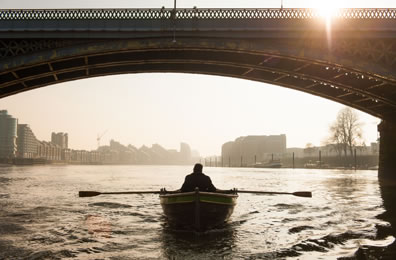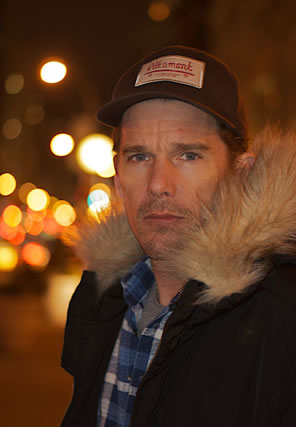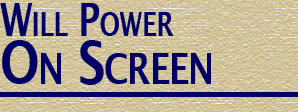Shakespeare Uncovered
PBS Series Gets Inside Shakespeare’s Genius
BBC, Blakeway Productions and Thirteen (WNET) (2012)
Hosted by Ethan Hawke, Joely Richardson, Derek Jacobi, Jeremy Irons, David Tennant, Trevor Nunn.

Jeremy Irons rows down the Thames in London, above. Below, Ethan Hawke in New York City. Both host episodes of the PBS series Shakespeare Uncovered, with Irons tracing the routes of Shakespeare's Henry IV and Henry V and Hawke pursuing his own journey into the mind of Macbeth. Photo courtesy of Alex Brenner, WNET.
Ethan Hawke learning the pronunciation of Hecate and the definition of murther from a veteran player of Macbeth and getting a tour of Dunsinane Hill on his iPad. David Tennant and Jude Law discussing the many meanings of Hamlet’s dying line, “The rest is silence.” Actors at the Blackfriars Playhouse in Staunton, Va., rehearsing sound effects without electronics for The Tempest. Jeremy Irons visiting the room where the real Henry IV died, noting the ceiling the king would have gazed at in the last minutes of his life. Derek Jacobi showing the root of Richard II’s arrogance, not just by acting in Shakespeare's play himself but by looking at the real king’s portable altar now at the British National Gallery.
Such details enrich the six hour-long documentaries that make up Shakespeare Uncovered debuting on PBS stations in the United States on January 25 (check local listings). But it is the overall tone of the series—accessible and adventurous—and the wide variety of Shakespeare performances sampled in each episode that make it a crowning achievement in Shakespeare television.
Shakespeare Uncovered uncovers and covers more ground than most of us experience in a lifetime of Shakespeareancing. Calling on actors, directors, Shakespearean scholars, historians, psychologists, and even Rowan Williams, the 104th Archbishop of Canterbury, and using representations of performances going back 200 years, the series goes inside nine plays and the genius who wrote them. Actors Hawke, Jacobi, and Tennant, and director Trevor Nunn host episodes on, respectively, Macbeth, Richard II, Hamlet, and The Tempest, while actress Joely Richardson takes on the comedies of Twelfth Night and As You Like It, and Irons combines Henry IV Parts One and Two and Henry V in his episode. With the individual hosts seeming to hold real influence over the tone and content of their shows, the quality of offerings is uneven over the course of the series, but even the flawed episodes have enough gemstone moments to make them worth the watching.
The series opens at its pinnacle with Hawke’s exploration of the man and motives of Macbeth. Hawke has never played the infamous Scot, but he takes us on his personal journey of learning every aspect of the character as if he had just been cast in the role. Hawke reaches out to other actors for their experiences with the role (Antony Sher’s description of the Banquo ghost scene as Macbeth dreaming while awake is a clinic for actors, directors, scholars, and Shakesgeeks alike). Hawke also takes in a wordless representation of the play in New York, gets a virtual tour of Scotland from a historian, talks with a forensic psychotherapist, reads the First Folio, and screens movies. “It’s weird to see such ego and such humility at the same time,” Hawke says as he watches footage of Orson Welles describe playing Macbeth.
Aside from such unflinching observations from Hawke, what makes this episode so compelling is its atmosphere and attitude. Filmed mostly in New York, the city becomes a landscape harboring “the darker side of the human psyche,” much as do the Scottish heath and castles in the play. “What’s so unsettling about this play is that the one characteristic that undoes Macbeth is, simply, ambition,” Hawke says as we see New Yorkers going about their business. Hawke’s narration accompanies the camera following him through the city, with quick edits and peculiar camera angles and focal points turning what could have been a talk-heavy documentary into a film noir thriller in its own right. Note the bell tolling with the flashing Don’t Walk sign.

Photo courtesy of Tim Pollard, WNET.
Hawke, meanwhile, plays the part of Mr. Everyman rather than the incredibly talented actor he really is, an actor with the chops to do great Shakespeare himself. In one scene, veteran actor Richard Easton helps Hawke work through one of Macbeth’s speeches. “What’s murther?” Hawke asks. “Murder,” Easton calmly replies. A doh! moment? Actually, it's a chance to see how the character of Macbeth takes physical shape just by words alone when Hawke asks Easton to read the passage, which he does in practiced verse speaking. “There’s always a certain magic that happens when you say the lines out loud that you can’t anticipate,” Hawke says, “It feels like a spell.”
Tennant takes a similar approach as he hosts the episode on Hamlet; except, while Hawke has never played Macbeth, Tennant is considered this generation’s great Hamlet from his Royal Shakespeare Company performance in 2008–2009. He gives us so many valuable moments in talking with other Hamlets and combining these conversations with analysis by scholars that we clearly see into the many-faceted diamond that is this character. As Tennant notes, there are as many dimensions to Hamlet as there are people to play or read him. He also introduces us to the real person who played Yorick in his RSC production—well, actually, it is the skull of a real person. It’s an ewww moment (or, as Hamlet says, “My gorge rises at it”).
Yet, this episode’s keenest moment comes when Tenant gets to review and compare the three original texts of the play: the First “bad” Quarto, the Second Quarto, and the First Folio. It comes across like the parable of the butterfly: how much different might the world be if we didn’t have the First Folio and the original quarto had prevailed with it’s scaled-down “To be” soliloquy, a version only a copy editor could love for its brevity.
While his fellow actors approach their subjects as actors, Irons takes on the role of travelogue historian in hosting the episode on the Prince Hal trilogy. Ironically, he had just finished wrapping a production of these plays for the BBC in which he played Henry IV—and what a great Bolingbroke he makes, based on the snippets we see in this program. Whether playing that king or recounting that king’s history, Irons is a commanding presence, and his retracing the actual steps of Henry and Hal through Shakespeare’s eyes is revealing of the plays (blockbusters in the 1590s), of the playwright (blatantly plagiarizing), of the real monarchs, and of ourselves, too, as Irons in a poignant visual links Hal’s battle at Agincourt to modern warfare. Don’t fret that Irons himself doesn’t talk much about acting in this episode; interviews with Tom Hiddleston playing Hal in the BBC production are among the most enjoyable and insightful in the whole Shakespeare Uncovered series.
Jacobi, who performed a benchmark portrayal of Richard II in the BBC/Time-Life series in 1978 (which he screens with much commentary in this episode), makes similar modern-day comparisons as he explores the psyche of that self-deluded king. He not only works in images of such recently toppled tyrants as Saddam Hussein and Muammar Gaddafi, Jacobi also boldly references the downfall of Margaret Thatcher at the hands of her onetime political allies and likens the simultaneous fall and rise of Richard and Bolingbroke in the play to U.S. presidential inaugurations.
The episode veers wildly off-track, though, when Jacobi expounds on the theory that Shakespeare of Stratford did not actually write the plays. We are subjected to a visit to Hedingham Castle, the ancestral home of Edward de Vere, the 17th Earl of Oxford and touted by the Oxfordians (including Jacobi) as the true author of the plays. There we see Jacobi conferring with Jason Lindsay, a de Vere ancestor and current owner of the castle, about the “amazing conspiracy” of Shakespeare’s authorship, Jacobi displaying as much arrogance as the king he once played, and Lindsay mumbling historical inaccuracies and mangling facts. At least we get rebuttals. After this intrusion, scholar Jonathan Bate solidly refutes Jacobi’s contentions, and in his Hamlet episode, Tennant visits the Stratford school Shakespeare attended where, even today, boys learn Latin and rhetoric, the very training for a playwright that the Oxfordians claim wasn’t sufficient schooling for a genius.
Still, the detour by Jacobi is an unnecessary—nay, irresponsible—detraction on the part of the producers and a disservice to the rest of the series. It would be like a documentary on the Apollo moon missions featuring a test pilot—a really good test pilot, even—claiming the moon landings never happened but were staged as part of a huge conspiracy because he, personally, can’t imagine the technology required to achieve those missions. Nunn in his episode on The Tempest expounds on his pet theory (shared by many, debunked by more) that Prospero is Shakespeare’s autobiographical portrait, though Helen Mirren, who played “Prospera” in the Julie Taymor film, is the most featured interview. Perhaps, then, if each episode drew its contextual emphasis from the host’s dispositions, the Oxfordian intrusion may have been part of the price of signing Jacobi. If that were the case, it would have been better to pick somebody else, even though that would mean missing out on hearing Jacobi recite the “sceptered isle” speech. (As it is I’d recommend schools simply skip this episode rather than waste time on students' subsequent “is Shakespeare real” questions.)
Richardson’s installment on Twelfth Night and As You Like It is the series’ only other stumble. Her only obvious Shakespearean credential is that she is the daughter of Vanessa Redgrave, a great Rosalind in the early 1960s. Though daughter interviews mother, the episode contains too much psychobabble from Richardson and too little insight from Redgrave and other actors and directors. An episode focusing on strong women in Shakespeare comedies needed a stronger, less self-centered woman hosting. But, even in this episode, we get wonderful clips of the plays in performance, not only Redgrave’s but also recent productions at Shakespeare’s Globe in London.
The whole series is centered on Shakespeare’s Globe. In fact, it almost comes off as an infomercial for the theater built as a replica of the original Globe, though when Nunn wants to illustrate the stage effects necessary to put on The Tempest in Shakespeare’s indoor theater, the producers go to the Blackfriars replica in Virginia. Supplementing performance footage from movies and filmed stage versions of the plays, each episode uses a group of actors to stage rehearsals and perform scenes at The Globe. These are good actors, including Jamie Parker, who played Hal on that stage, and listening to their discussions about scenes and dialogues adds to our journey.
What a wonderful journey it is, too. Despite the bumpy road of the comedies episode and the detour courtesy of the Oxfordian conspiracy theory you’ll travel from peak to peak in Shakespeare Uncovered, peering into the plays, their characters, the real playwright, and the many actors, directors, and scholars who know him and his work so well.
Eric Minton
January 18, 2013
Comment: e-mail [email protected]
Start a discussion in the Bardroom



 Find additional Shakespeareances
Find additional Shakespeareances